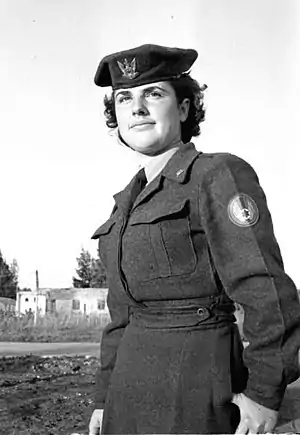Esther Arditi
Esther Arditi (1937 – 20 February 2003), also known as "The Angel in White," was an Israeli IDF medic, and the only woman to be awarded the Israeli Medal of Distinguished Service.

Early life and education
Arditi was born in 1937 in Sofia, Bulgaria, but grew up in Italy during the Second World War. After graduating from high school, she immigrated to Israel and enlisted in the Israeli Air Force.[1]
Career
A week after earning her medic certification in 1954, Arditi saved combat pilot Yaakov Salomon and navigator Shlomo Hertzman from a burning Mosquito FB6 which had been struck by lightning while landing in a storm.[2][3] She began to steer an ambulance to the scene but it became stuck in mud caused by the storm.[4] Arditi abandoned the ambulance and ran on foot towards the burning plane where she pulled out the injured crew just before it exploded.[5] As a result of her heroism, she became the first and only female soldier to be awarded the Israeli Medal of Distinguished Service.[1]
She continued her military involvement during the Six-Day War and Yom Kippur War, where she volunteered as a medic in a field hospital.[1] Her achievements in the military earned her the nickname "Angel in White," which stayed with her until she died of cardiac arrest on 20 February 2003.[6]
References
- Ahronheim, Anna (7 March 2018). "David Ben-Gurion wanted more women in government, IDF archives reveal". The Jerusalem Post. Archived from the original on 13 March 2019. Retrieved 19 February 2020.
- Cohen, Shir (20 February 2013). "Celebrating the Heroism of Esther Arditi". Israeli Air Force. Archived from the original on 22 May 2019. Retrieved 19 February 2020.
- Brian Cull (1996), Wings Over Suez, Grub Street, p. 60, ISBN 9781898697480
- "The Israeli Air Force : Celebrating the Heroism of Esther Arditi".
- "בין מלחמת העצמאות למבצע קדש" (in Hebrew). Israel Defense Forces. Archived from the original on 3 March 2016. Retrieved 19 February 2020.
- Baron, David (24 February 2003). "נפטרה אסתר ארדיטי, "המלאך בלבן" של צה"ל". Makor Rishon (in Hebrew). Retrieved 19 February 2020.